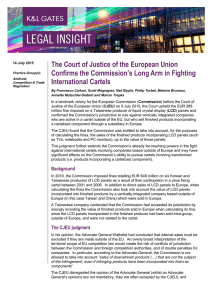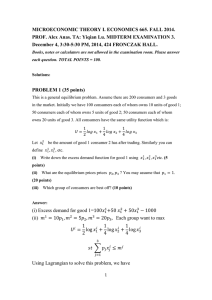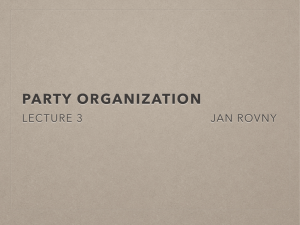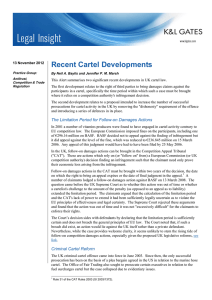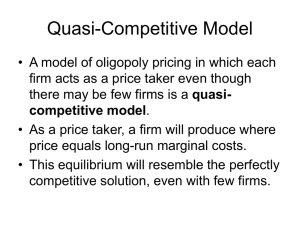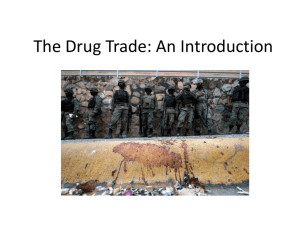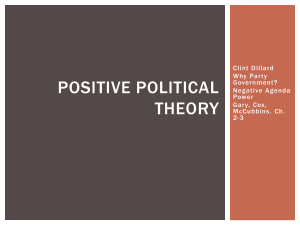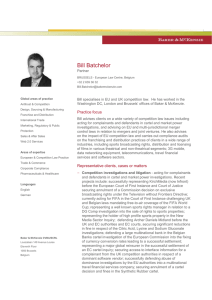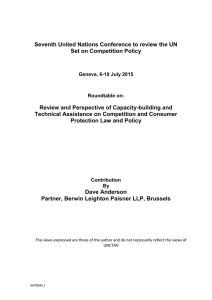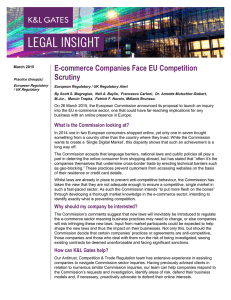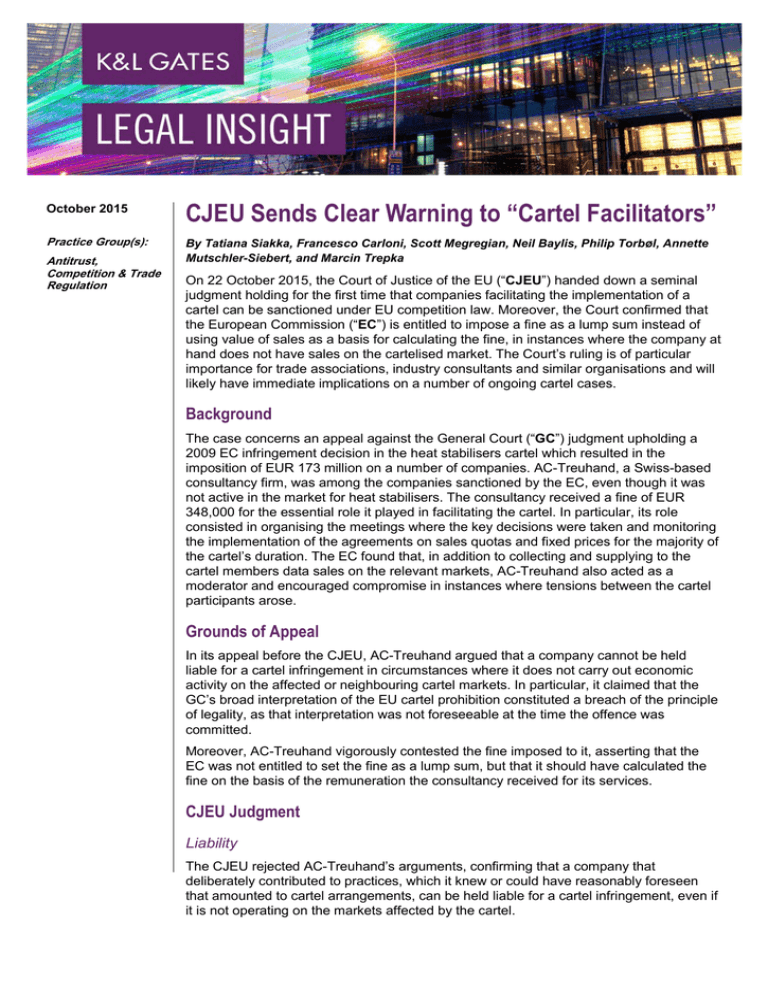
October 2015
Practice Group(s):
Antitrust,
Competition & Trade
Regulation
CJEU Sends Clear Warning to “Cartel Facilitators”
By Tatiana Siakka, Francesco Carloni, Scott Megregian, Neil Baylis, Philip Torbøl, Annette
Mutschler-Siebert, and Marcin Trepka
On 22 October 2015, the Court of Justice of the EU (“CJEU”) handed down a seminal
judgment holding for the first time that companies facilitating the implementation of a
cartel can be sanctioned under EU competition law. Moreover, the Court confirmed that
the European Commission (“EC”) is entitled to impose a fine as a lump sum instead of
using value of sales as a basis for calculating the fine, in instances where the company at
hand does not have sales on the cartelised market. The Court’s ruling is of particular
importance for trade associations, industry consultants and similar organisations and will
likely have immediate implications on a number of ongoing cartel cases.
Background
The case concerns an appeal against the General Court (“GC”) judgment upholding a
2009 EC infringement decision in the heat stabilisers cartel which resulted in the
imposition of EUR 173 million on a number of companies. AC-Treuhand, a Swiss-based
consultancy firm, was among the companies sanctioned by the EC, even though it was
not active in the market for heat stabilisers. The consultancy received a fine of EUR
348,000 for the essential role it played in facilitating the cartel. In particular, its role
consisted in organising the meetings where the key decisions were taken and monitoring
the implementation of the agreements on sales quotas and fixed prices for the majority of
the cartel’s duration. The EC found that, in addition to collecting and supplying to the
cartel members data sales on the relevant markets, AC-Treuhand also acted as a
moderator and encouraged compromise in instances where tensions between the cartel
participants arose.
Grounds of Appeal
In its appeal before the CJEU, AC-Treuhand argued that a company cannot be held
liable for a cartel infringement in circumstances where it does not carry out economic
activity on the affected or neighbouring cartel markets. In particular, it claimed that the
GC’s broad interpretation of the EU cartel prohibition constituted a breach of the principle
of legality, as that interpretation was not foreseeable at the time the offence was
committed.
Moreover, AC-Treuhand vigorously contested the fine imposed to it, asserting that the
EC was not entitled to set the fine as a lump sum, but that it should have calculated the
fine on the basis of the remuneration the consultancy received for its services.
CJEU Judgment
Liability
The CJEU rejected AC-Treuhand’s arguments, confirming that a company that
deliberately contributed to practices, which it knew or could have reasonably foreseen
that amounted to cartel arrangements, can be held liable for a cartel infringement, even if
it is not operating on the markets affected by the cartel.
CJEU Sends Clear Warning to “Cartel Facilitators”
Remarkably, in countering AC-Treuhand’s argument that it could not “reasonably
foresee” that its conduct would be caught by the EU cartel prohibition, the Court clarified
that a law may be foreseeable even if legal advice is required to assess potential
consequences of the given conduct.
“This is particularly true in relation to persons carrying on a professional activity, who are
used to having to proceed with a high degree of caution when pursuing their occupation.
“Such persons can therefore be expected to take special care in evaluating the risk that
such an activity entails…”
Fine
The CJEU confirmed that the EC is allowed to deviate from its value of sales
methodology if the particularities of a case, or the need to achieve a deterrent effect,
justify such a departure. As AC-Treuhand had no sales on the heat stabiliser market, the
CJEU held that to use only the consultancy services fees as the starting basis for the fine
would not “accurately reflect the economic importance of the infringements in question,
nor the extent of AC Treuhand’s individual participation". The EC was therefore entitled to
fix the basic amount of the fine imposed on AC-Treuhand as a lump sum.
Significance and practical implications
The judgment is of significant importance for a number of reasons. First, the Court
clarified that the EU cartel prohibition is broad enough to encompass “supportive”
conduct. By confirming that “cartel facilitators” are caught by EU competition rules, the
Court sends a clear and strong warning not only to consultancies but also to trade
associations and other professional bodies that provide services to their members similar
to those offered by AC-Treuhand, such as collection of sales data and organisation of
meetings. Moreover, by endorsing the EC’s discretion to impose lump sum fines, the
Court cautions that fines in such instances may be particularly harsh, as they do not have
to be calculated by reference to the company’s turnover.
Importantly, the judgment suggests that companies offering professional services have a
higher duty of care in assessing the antitrust compliance risk that their activities entail,
and that duty will often be met through recourse to legal advisers. In view of this, it is of
paramount importance for trade associations, and similar professional organisations to
take all reasonable measures to ensure full compliance with competition law, including
having external counsel attending meetings and advising on code of conduct.
Authors:
Tatiana Siakka
Francesco Carloni
Scott Megregian
Tatiana.Siakka@klgates.com
+44.(0).20.7360.8138
Francesco.Carloni@klgates.com
+48.22.653.4214
Scott.Megregian@klgates.com
+44.(0).20.7360.8110
Neil Baylis
Philip Torbøl
Annette Mutschler-Siebert
Neil.Baylis@klgates.com
+44.(0).20.7360.8140
Philip.Torbol@klgates.com
+32.(0)2.336.1903
Annette.Mutschler-Siebert@klgates.com
+49.(0)30.220.029.355
Marcin Trepka
Marcin.Trepka@klgates.com
+48.22.653.4214
2
CJEU Sends Clear Warning to “Cartel Facilitators”
Anchorage Austin Beijing Berlin Boston Brisbane Brussels Charleston Charlotte Chicago Dallas Doha Dubai Fort Worth Frankfurt
Harrisburg Hong Kong Houston London Los Angeles Melbourne Miami Milan Moscow Newark New York Orange County Palo Alto
Paris Perth Pittsburgh Portland Raleigh Research Triangle Park San Francisco São Paulo Seattle Seoul Shanghai Singapore
Spokane Sydney Taipei Tokyo Warsaw Washington, D.C. Wilmington
K&L Gates comprises more than 2,000 lawyers globally who practice in fully integrated offices located on five
continents. The firm represents leading multinational corporations, growth and middle-market companies,
capital markets participants and entrepreneurs in every major industry group as well as public sector entities,
educational institutions, philanthropic organizations and individuals. For more information about K&L Gates or
its locations, practices and registrations, visit www.klgates.com.
This publication is for informational purposes and does not contain or convey legal advice. The information herein should not be used or relied upon
in regard to any particular facts or circumstances without first consulting a lawyer.
© 2015 K&L Gates LLP. All Rights Reserved.
3

